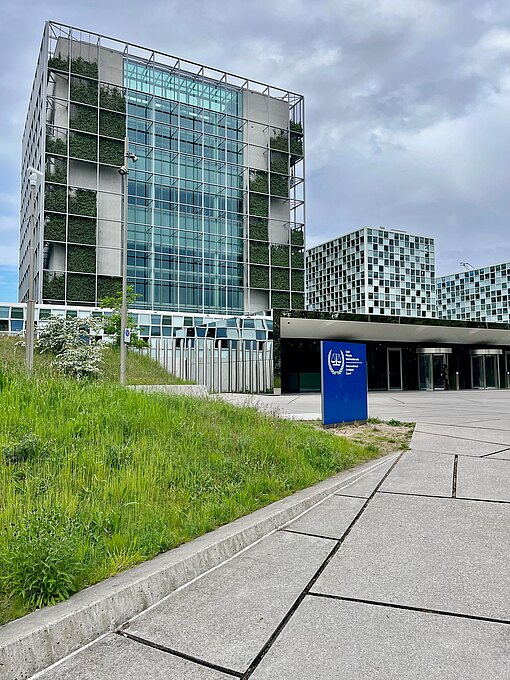19 August 2025, by Dr Pablo Gavira Díaz and Dr Pauline Martini
On 8 July 2025, Pre-Trial Chamber II of the International Criminal Court (ICC or Court) issued arrest warrants for Mr Haibatullah Akhundzada, Supreme Leader of the Taliban, and Mr Abdul Hakim Haqqani, Chief Justice of the Taliban, in the context of its investigation into the Islamic Republic of Afghanistan. The purpose of this brief comment is to provide the factual, legal and procedural contexts within which such warrants were issued, as well as to discuss the content and legal implications of the charges contained in the warrants.
1. Why did the International Criminal Court issue arrest warrants against Taliban leaders?
Pursuant to Article 58 of the Rome Statute of the ICC, the Pre-Trial Chamber shall issue an arrest warrant if there are reasonable grounds to believe that the person has committed a crime falling within the jurisdiction of the Court, and if such arrest appears necessary to ensure their appearance at trial, to protect the integrity of the proceedings or to prevent the commission of other offences. The warrants issued against Mr Akhundzada and Mr Haqqani allege that both individuals, who have held de facto authority in the country since 15 August 2021, are responsible for crimes against humanity, specifically persecution based on gender and political grounds. The Chamber believes there are reasonable grounds to conclude that Mr Akhundzada and Mr Haqqani ordered, induced or solicited the persecution of girls, women and persons who do not conform to the Taliban’s policy on gender, as well as those perceived as “allies of girls and women”. These crimes are believed to have occurred from the Taliban’s return to power in August 2021 through at least 20 January 2025.
The Chamber noted that the Taliban enacted government policies leading to serious human rights violations in Afghanistan, including murder, imprisonment, torture, rape and enforced dissapearances. The Chamber also considered that while the Taliban imposed restrictions on the general population, they specifically targeted women and girls on account of their gender, depriving them of basic rights such as education, privacy, family life and freedoms of movement, expression, thought, conscience and religion. According to the same Chamber, the persecution extended beyond direct violence to include institutionalised harm through discriminatory laws and societal norms. Furthermore, individuals perceived as politically opposed to these policies, focusing on those supporting women’s rights, as well as persons expressing certain sexual orientations and/or gender identities, were also targeted.
While the warrants remain sealed to protect victims and the integrity of the proceedings, the Chamber chose to publicly acknowledge their existence in the interest of justice and to help deter further violations. The developments below are thus based on the ICC’s press release in relation to the arrest warrants, rather than on the arrest warrants per se.
2. What happened before the arrest warrants were issued?
Afghanistan joined the Court by depositing its instrument of accession to the Rome Statute on 10 February 2003. In accordance with Article 126(2) of the Statute, it officially became a State Party on 1 May 2003, granting the Court jurisdiction over crimes committed on Afghan territory or by Afghan nationals from that date onward. In 2007, the ICC Office of the Prosecutor (OTP) publicly announced the opening of a preliminary examination into the situation in Afghanistan, concentrating on alleged war crimes and crimes against humanity arising from the conflict between pro- and anti-Government forces. Under Article 15 of the Rome Statute, such an examination is a necessary first step before launching a formal investigation, allowing the OTP to determine whether there is sufficient information to proceed. The preliminary examination concluded in October 2017, when the Prosecutor notified the President of the Court of her intention to request authorisation to open an investigation into the situation of Afghanistan, in accordance with Article 15(3) of the Rome Statute.
In April 2019, Pre-Trial Chamber II rejected the Prosecutor’s request to open an investigation on the grounds that the opening of an investigation would not serve the interests of justice. This decision was reversed in March 2020, when the Appeals Chamber of the ICC authorised the Prosecutor to commence an investigation into alleged crimes under the Court’s jurisdiction related to Situation in Afghanistan. The same Chamber ruled that the Prosecutor could investigate crimes committed on Afghan territory since 1 May 2003, as well as related crimes occurring in other States Parties since 1 July 2002. Despite a deferral request from the Afghan government in March 2020, the ICC ultimately authorised the resumption of the investigation in October 2022, citing a lack of genuine national proceedings. In April 2023, the Appeals Chamber further aligned the scope of the investigation with the Prosecutor’s original mandate.
The investigation has since expanded, including a referral in November 2024 from six countries, namely Chile, Costa Rica, Spain, France, Luxembourg and Mexico, expressing support for the probe and stressing the need to look into the deterioration of the situation for women and girls in Afghanistan. In January 2025, the ICC Prosecutor announced that his office had filed applications for arrest warrants against Mr Akhundzada and Mr Haqqani for crimes against humanity, specifically persecution on gender grounds under the Rome Statute. The warrants were confirmed on 8 July 2025, as discussed above.
3. What does gender persecution mean, and is it recognised as a crime in the Rome Statute?
Persecution based on the grounds of gender is not a stand-alone crime under the Rome Statute. Rather, it is classified as a crime against humanity under Articles 7(1)(h) and (2)(g) of the Rome Statute, criminalising “the intentional and severe deprivation of fundamental rights contrary to international law by reason of the identity of the group or collectivity”. According to the ICC OTP's policy paper on gender persecution, this crime targets “persons because of sex characteristics and/or because of the social constructs and criteria used to define gender”. Within the meaning of Article 7(3) of the Rome Statute, gender refers to “the two sexes, male and female, within the context of society”. Those affected by gender persecution often include women, girls, men, boys and LGBTQI+ individuals. As a crime against humanity, gender persecution can take place both in times of armed conflict and in times of peace.
Six elements must be proven to establish the existence of gender-related persecution, with four of them constituting its material element (actus reus). First, the perpetrator must have severely deprived one or more persons of their fundamental rights under international law, such as the right to life, bodily integrity or freedom of movement. In the current case, Pre-Trial Chamber II noted that women, girls and individuals expressing gender or sexuality identity outside Taliban’s policy of gender were denied fundamental rights, including the rights to education, privacy, family life and freedoms of movement and expression, justifying the issuance of arrest warrants. Second, the targeting must be based on grounds listed in Article 7(1)(h), encompassing gender. In casu, Pre-Trial Chamber II stated that Mr Akhundzada and Mr Haqqani acted on this basis. Third, the conduct must be linked to at least one crime within the jurisdiction of the ICC, namely other crimes against humanity, war crimes, genocide or the crime of aggression. In the context of the case at hand, the press release announcing the arrest warrants suggests that gender persecution was committed in connection with murder, imprisonment, torture, rape and enforced disappearances, all of which resulting from the Taliban's policy on gender. Fourth, the conduct must have been part of, or intended to be part of, a systematic or widespread attack directed against a civilian population, which the Pre-Trial Chamber attributed to Taliban governmental policy. In accordance with Article 7(2)(a) of the Rome Statute, an “attack directed against any civilian population” refers to a course of conduct involving multiple acts -such as gender-related persecution– carried out against civilians as part of a state or organisational policy.
Two additional elements, related to the perpetrator's state of mind (mens rea), must be demonstrated to prove gender persecution. The perpetrator must have known or intended the conduct to be part of a widespread or systematic attack against a civilian population and must have targeted individuals by reason of their group identity or collectivity, or must have targeted the group or collectivity as such. In cases of gender persecution, discriminatory intent may be based on gender criteria imposed to a group or collectivity by the perpetrator, such as “roles, behaviours, activities and attributes", as well as "physiological characteristics or attributes assigned to males and females". The Al Hassan case shows how expectations, like women staying at home for childcare and domestic duties, can reflect such discriminatory intent on the part of the perpetrator.
Importantly, gender persecution must be distinguished from “gender apartheid”, which currently does not constitute a crime under international law, despite calls from civil society organisations. Yet, some States have expressed support for incorporating “gender apartheid” into the draft Crimes Against Humanity Treaty during negotiations, as reflected in the International Law Commission’s 2019 Draft.
4. What are the next stages in the proceedings?
The upcoming steps in the proceedings against Mr Akhundzada and Mr Haqqani involves their arrest and surrender to the ICC, after which the pre-trial phase will continue up until the confirmation of charges stage. Pursuant to Part 9 of the Rome Statute, States Parties to the Rome Statute, including Afghanistan, have the general obligation to cooperate fully with the ICC in its investigation and prosecution of crimes. This encompasses the duty to comply with requests for arrest and surrender. Such development seems however unlikely, as Taliban spokeperson Mr Zabihullah Mujahid recently stated that Afghanistan no longer recognises the ICC, nor does it acknowledge any obligation toward it. To date, Afghanistan has not formally notified the Secretary-General of the United Nations of any intention to withdraw from the Rome Statute, as Hungary recently did. A different issue is whether the Taliban regime, widely unrecognised by the international community, has the authority to effectively terminate Afghanistan’s membership in the ICC.
The arrest warrants constitute a significant development as it is the first time that an international tribunal recognised that LGBTQI+ people could be victims of persecution on grounds of gender, according to Lisa Davis, ICC Special Adviser on Gender and Other Discriminatory Crimes. In this regard, Professor Dr Christoph Safferling, Director of the Nuremberg Academy, welcomes the issuance of the arrest warrants with what he describes as “positive but moderately optimistic development”. He notes that this “reflects a strategic decision by the ICC OTP to focus on senior political and military leadership as part of its broader accountability efforts”. While this approach underscores the ICC’s commitment to addressing alleged crimes at the highest levels of authority, Professor Safferling also emphasises the inherent challenges in ensuring enforcement. He observes that, when viewed in light of other ongoing situations before the Court—such as those concerning Ukraine and Palestine, where arrest warrants have been issued against high-profile figures including President Vladimir Putin and Prime Minister Benjamin Netanyahu—, “the issuance of such warrants, while symbolically and legally significant, does not automatically translate into arrest and surrender”. Nevertheless, he acknowledges the move “as a prudent reaffirmation of the Court’s mandate and as a step toward fostering accountability at the highest level of power, as Nuremberg Principle III reminds us”. (pm/pg)



